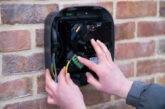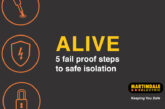
Lee Ward, electrician and owner of Pure Electric, casts his eye over the current state of play in the electrical industry and explains why improving standards will require a collective effort.
It’s a privilege to be asked again by PE to put together some thoughts on how I see the ever-changing industry we all love and which has so much to offer.
A few years ago, I featured in the magazine and talked about what my personal wishes would be for the industry if I had a magic wand. With two decades (and counting) of varied and extensive experience across the electrical industry I’ve had the opportunity to observe the many changes and challenges which are a constant for us all.
I should also point out that this isn’t a rant, nor a moan or groan, or a poke at any particular area of industry. Although the thoughts are personal to myself, I’m instead hoping to convey the way your average on-the-tools spark looks at the overall industry.
Working as an electrician, whether that be employed, self-employed, sub-contracting or any other form, can be one of the very best professions anyone could choose to learn and embrace. It can also be one of the most challenging and frustrating for a whole variety of reasons.
In all honesty, since my last article where I articulated my outlook on various subjects, the vast majority, if not all, of what was said is still very relevant today.
Whilst we have some proclaiming that all is positive and rosy, we on the front line realise that what we see is not always a true reflection of what they see and this is the challenging divide. We all want the best for our industry as a whole and to raise standards, but is ‘raising standards’ where the challenge really lies?
Standards and accountability
Why should standards need to be raised when we all see standards across the industry which are designed to govern our workmanship? Instead, I’d ask who is policing the industry? Who maintains standards, and who is accountable?
We all see daily examples in our work and through social media of the reality of practices, the dodgy installation works and, more worryingly, the standards of EICRs. It’s very concerning!
It is encouraging to see that many have now realised that the fast-track ‘boil-in-a-bag’ domestic electrician routes are not fit for purpose, which shines a light on what Part P actually brings to the table. The recently introduced ‘Experienced Worker’ route for those wanting to become a fully-fledged electrician mid-career is a step in the right direction here, but even then I believe there are flaws to this system.
I also talk frequently with individuals who share my frustrations with apprentices not being able to obtain proper apprenticeships, and those that believe the rates for electricians are simply not good enough, which I agree with entirely. In an industry that I see as being so fragmented, so divided, and so dismantled, is it any wonder that no one really understands or knows what a “fully qualified electrician” is anymore. Does such a thing exist?
Questions to be asked
I think we could all do more to raise questions around these areas of concern. What has Part P done for the industry? Who or what does it serve and protect? Have there been any prosecutions via LABCs or approval bodies? What does LABC do to enforce Part P? Do they even know what is required, what to check, what to investigate, and what to prosecute? Every time you pay for a Part P notification, what are you getting for your money, and what is your client getting?
When it comes to aspiring to be a reputable electrician and electrical contracting business it should be all about standards, service and, ultimately, pride. Yet how can anyone expect high standards when the prices of EICRs, for example, are at an all-time low? And this doesn’t even take into account the absolute cesspit that has become known in the industry as ‘drive-by’ EICRs!
My personal feeling is that it’s so easy to compete in the ‘race to the bottom’, but much harder to strive for standards, pride and passion. But do your clients even care about this? The honest answer is that some will, and some won’t. For those that fall into the latter category, and are seduced by the cheapest price, I’m just as happy about walking away from the job as they are to tell me it’s too expensive.
At the end of the day, if everyone works on the principle of the race to the bottom nobody wins, and especially not electricians. I’ve always stood by the saying “change your clients, not your prices”, because we can all be busy doing cheap work, but is that what you really want?
The reality is that we’re faced with a double-edged sword. We certainly need the approval bodies and those tasked with governing the industry to raise their collective game by enforcing a much stronger system of assessments and absolute thorough investigations of EICRs.
In addition to a much more robust system of EICR standards, I believe that a positive step would be the introduction of a reporting system tool to help and enable the approval bodies to investigate members who are not upholding the principles and standards of BS 7671 which, after all, is a prerequisite of the membership criteria.
This should allow electricians to securely report and provide evidence to an approval body when they come across non-compliant (dangerous and potentially dangerous) work by a scheme member.
These cases for reporting must be clear and obvious but also factual evidence must be provided by way of on-site photos, copies of installation certificates or copies of invoices as proof of who carried out the works, and, of course, written permission from the client to give authorisation for the electrician to act on their behalf, given the technical challenges such a scenario involves.
We, as frontline professionals, also need to realise the responsibility, accountability and ethical standards placed upon us when we sign off an installation certificate or report.
Duty of care
As practicing electricians, we all have a duty of care towards our customers and this amazing industry in which we operate, but which is far from perfect. If we could put the differences aside and come together to help inspire and build a safer, brighter future for all, we would start to see a positive impact almost instantly.
As it stands, many electricians still feel that they’re operating with one hand tied behind their back, and it’s hard to argue against that being the case.
So, change needs to come from every facet of the industry – and that starts from the very top, right down to the very bottom.
If you feel like you’re swimming against the tide and not being heard, do what you should do and simply vote with your feet.
And remember, be kind and have pride in all you do in life.
A marathon effort
On that note, I’d really appreciate any support PE readers can offer in my charity challenge that I’m undertaking for my amazing daughter, Amelia. This will involve me running 12 half marathons in the space of 12 months. Please take a look and donate if you can at: www.justgiving.com/page/lee-ward-1706 226359382
Find more industry feature articles here











